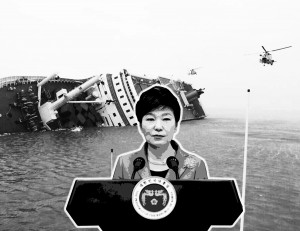President Park wrong to take advantage of national tragedy
South Korean President Park Geun-hye arrives at the Jindo gymnasium, where parents and loved ones of those caught in the wreckage are camping and awaiting any news of a potential rescue. She is escorted to the stage by a group of officials, her eyes glazed and half-shut with fatigue, her lips pressed into a somber grimace. She begins to address the crowd with reassurances of rescue efforts and asks for their understanding, when she is cut short by an uproar from the audience — parents yelling and screaming.
“What do you want me to understand?” a man screams. “If you had a daughter who was freezing to death in the ocean water, would you understand?”
Such are the scenes portrayed on Korean television network Seoul Broadcasting System in its news documentary Sewol Sinking, which aired on the SBS television network earlier this week.
The news documentary covered the response to one of South Korea’s largest national tragedies, the recent sinking of the ferry Sewol off the coast of Jindo, South Korea. As of press time, USA Today reports that 159 people are confirmed dead and 143 more are still missing. Out of 476 individuals on board, 174 have been rescued.
Among the first individuals rescued was Sewol Captain Lee Jun-seok, who abandoned ship along with members of his crew while the vast majority of his passengers were left behind.
Lee instructed his crew not to let passengers evacuate immediately while the ship was listing. Lee’s primary concern was that the turbulent ocean conditions might disperse evacuees and make them difficult to track down and rescue. He issued an evacuation order 35 minutes after sending out a distress signal, telling passengers to stay in their cabins until otherwise instructed, according to BBC News.
Lee’s actions did not come from an understanding of standardized evacuation procedures. The lack of experience and emergency preparedness of the vessel’s crew members only expose inadequate governmental enforcement of even rudimentary evacuation training in a country that is considered to be one of the most technologically advanced and highly developed in the Pacific Rim.
South Korea is a thriving westernized democracy that, to the world at large, is renowned for its cutting edge semiconductor and consumer technologies in addition to a rapidly growing automobile export industry.
This national tragedy, however, has brought many of the country’s lesser-known issues to the forefront. It seems as if everyone has a reason to point a finger in the tragedy to push an agenda. In addition to the countless moral indictments against Lee, a Korea Times editorial published last Friday pointed to the fact that the ship had loaded three times the recommended weight of cargo, ostensibly making it more difficult to handle.
The most unsettling instance of finger pointing, however, actually came from South Korea’s president.
“The actions of the captain and some of the crew are absolutely unacceptable, unforgivable actions that are akin to murder,” Park said Monday in a statement released from her office.
Park’s statement encapsulates the sentiment of many Koreans who feel sadness and outrage at the events which transpired last week. But the statement serves a dual purpose: It deflects attention from the administration’s shortcomings and points to the actions of an individual as the gravamen for the tragedy.
South Korea is still in the wake of a national disaster, and there are missing people to be recovered. Yet for its president to so swiftly point the finger at Lee and call his actions “akin to murder” smacks of political maneuvering at a time where a head of state should be stabilizing its people and understanding the actual issues that contributed to the tragedy.
This is not the first South Korean ferry accident that occurred partially as a result of a vessel being over capacity: In 1993, the MV Seohae sank and killed 292 people. In addition to heavy cargo and inclement conditions, the ship was carrying 362 people, despite a legal maximum capacity of 221 passengers.
The greatest disservice to the passengers of the Sewol has been the fact that history has been permitted to repeat itself. Adding insult to injury is the Park administration, which is exploiting Lee as a scapegoat to cover up the failure to properly enforce laws that protect the nation’s citizens.
In the aftermath of a national tragedy, it is incumbent upon the head of state to respect the gravity of the situation and find ways to implement enforcement of safety regulations so that history does not repeat itself yet again. Park’s desperate politicization of the mourning process is a disservice both to the families who lost loved ones in last week’s tragedy and to South Korean democracy. Despite their recent arrests, Lee and his crew are not the ones solely at fault for the ferry’s sinking, and they shouldn’t be made easy scapegoats for government under-enforcement and a shipping company’s greed.
What happened in South Korea was a national tragedy — but the onus is on the South Korean government to effect meaningful changes and resist the political inclination to be the playwright.
Euno Lee is a senior majoring in English Literature. He is also the Managing Editor of the Daily Trojan.

